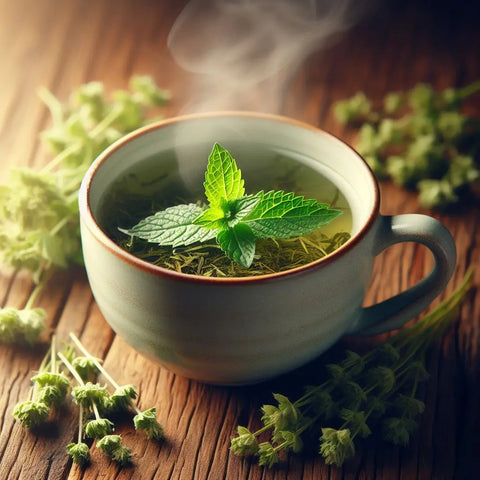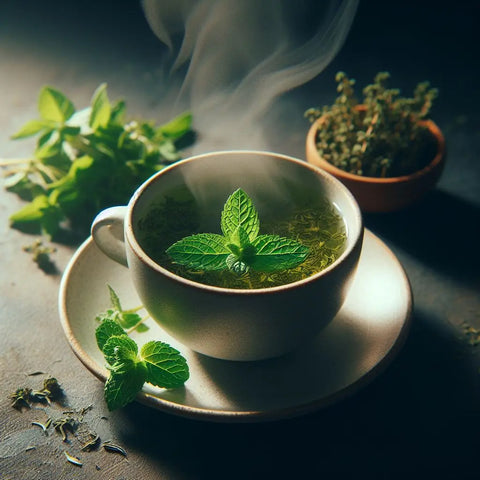The Mystique of Mugwort Tea Benefits, Side Effects, and How to Use It
Open the Mysteries of the Dream Land with Mugwort Tea
Mugwort Tea
Mugwort is a common name for several species of aromatic flowering plants in the genus Artemisia. In Europe, mugwort most often refers to the species Artemisia vulgaris, or common mugwort. In East Asia the species Artemisia argyi is often called "Chinese mugwort" in the context of traditional Chinese medicine, Ngai Chou in Cantonese or àicǎo for the whole plant in Mandarin, and àiyè for the leaf, which is used specifically in the practice of moxibustion. Artemisia princeps is a mugwort known in Korea as ssuk and in Japan as yomogi. While other species are sometimes referred to by more specific common names, they may be called simply "mugwort" in many contexts.
Mugwort shares a similar role in the kitchen as sage and is popularly used to season meats and was a precursor to the use of hops in flavoring beer.
It is one of several species in the genus Artemisia commonly known as mugwort, although Artemisia vulgaris is the species most often called mugwort. Mugworts have been used medicinally and as culinary herbs.
Mugwort is a plant that may have several benefits for health, such as the reduction of arthritis, digestive complaints, and menstrual symptoms.
Mugwort is a plant that may provide multiple benefits, including for menstruation, scar itch, and bacterial infections. Risks of mugwort can be mild to severe.
| Plant Classification |
Artemisia vulgaris |
| Description | Reaches up to 6 feet tall on ridge-like stems found in green or purplish red shades. Leaves are uniquely shaped and pointed, growing opposite each other, with small hairs on the underside and deep green in color. Flowers grow along many stems, small and varying in color (white, yellow, or red) |
The sage-colored plant is commonly used for beer-making but is also thought to prevent or treat health conditions like anxiety, digestion problems, and irregular periods, among others. Mugwort has seen continuous use in many cultures throughout the world as a medicinal, spiritual, and culinary ingredient since at least the Iron Age. In contemporary culture mugwort is commonly found in foods and drinks, and remains a common ingredient in Chinese, Japanese, and Korean traditional medicine, where the leaves are used directly as a food or to obtain oil extracts or tinctures. The roots, leaves, stems, and blossoms of the mugwort plant are all used in folk medicine to make tinctures, extracts, tonics, teas, powders, and essential oils. This article describes medical uses, possible side effects, and how to select and safely use mugwort.
Mugwort Benefits
Many people consider mugwort a common weed. It spreads aggressively and can take over large parts of a garden. Because it's related to ragweed, people who are allergic to ragweed may be allergic to mugwort, as well. So, some people destroy mugwort when it turns up in their garden. But in certain parts of the world it's purposely grown to make herbal medicine.
Reported mugwort benefits include:
• Relieving stress
• Boosting energy
• Improving sleep
• Promoting blood circulation
• Relieving headaches
• Supporting liver health
• Itch relief
• Easing digestion problems
• Relieving muscle aches
• Normalizing menstrual cycles
In the area of regular implantations, relatively few teas hold as much interest and persona as mugwort dream tea. This old beverage, soaked with many long periods of custom and old stories, has enchanted the inventive brains of visionaries, mystics, and healers alike. Gotten from the unassuming yet solid mugwort plant, this enchanting tea promises to make the way for the dream land, offering an extraordinary and huge experience for those attempting to examine the profundities of their minds.
Mugwort dream tea is a curious and beguiling blend that has been regarded for its alleged ability to actuate clear dreams and overhaul dream surveys. This local combination has its fundamental establishments in obsolete Chinese, European, and neighborhood American traditions, where the mugwort plant was used in various powerful and helpful practices. Today, mugwort dream tea has obtained a serious following among those enthralled by the space of dreams and the journey of self-disclosure.
Mugwort belongs to the Artemisia genus, which is also associated with wormwood. These two common names can sometimes be confused, as can their purposes. While wormwood is generally more potent, mugwort serves as a mild vermifuge and anthelmintic, assisting in the expulsion of parasites.
For example, mugwort is colloquially known as St. John’s herb, wild wormwood, cronewort, and chrysanthemum weed, while wormwood is known as absinthe, absinthe wormwood, and, you guessed it, mugwort. This no doubt leads to some confusion with these two plants, but hopefully, now you have some clues as to how you can best tell them apart.

Explanations:
Opening the Dream Space: One of the most enchanting pieces of mugwort dream tea is its ability to invigorate the dream state and update dream uniqueness. While the particular frameworks are not totally seen, it is acknowledged that the blends found in mugwort, for instance, thujone and wormwood, partner with the psyche's neurotransmitters, conceivably influencing the dream knowledge.
Updating Dream Survey: Past starting unmistakable dreams, mugwort dream tea is also said to additionally foster dream audit. Various dedicated visionaries and experts report having a significant choice in their dreams with more vital clarity and detail, resulting in consuming this mysterious tea before rest time. This raised dream survey can be a significant instrument for those searching for personal growth, creative inspiration, or a more significant perception of their mind.
Progressing Loosening up: despite its dream-related benefits, mugwort dream tea is acknowledged to have calming and relaxing properties. The sensitive scent and subtle sort of this tea can help with impelling a sensation of tranquility, making it an ideal beverage to taste before rest time. This relaxing effect could contribute to additional rest quality and working in the dream state.
Traditional Repairing Properties: Since long before recorded history, the mugwort plant has been used in various standard prescription systems for its useful benefits. Mugwort dream tea is made sure to have expected quieting, stomach-related, and female-coordinating properties, but more assessment is supposed to totally demonstrate these cases.
Connecting with Old Traditions:
Drinking mugwort dream tea isn't just a real experience; it is, in a way, a symbolic exhibition of communicating with old, endlessly rehearsed traditions. By partaking in this otherworldly beverage, individuals can exploit the knowledge and functions of social orders that have cherished the mugwort plant for quite a while, empowering a sensation of reverence and appreciation for the customary world.
Features and Benefits:
- Propels clear dreaming and further develops a dream audit.
- may incite an easygoing state, supporting better rest quality.
- Reasonable supportive benefits, including moderating and stomach-related help
- interfaces individuals with old traditions and practices
- intriguing and captivating flavor profile for a truly stunning experience.
Esteeming and Availability:
Mugwort dream tea is for the most part available in various designs, including free leaf blends, tea sacks, and, shockingly, new or dried mugwort for home getting ready. The assessment of mugwort dream tea can vary depending on the quality, getting, and brand.
- Free leaf mugwort dream tea: \$8 to \$18 per 100 grams
- Mugwort dream tea sacks: \$5 to \$10 per box of 20–30 tea packs
- New or dried mugwort for home maturation: $6 to $15 per gathering or pack
Better type, strength, and guaranteed regular mugwort teas could arrange a first-class esteem due to the mindful getting and taking care of strategies included.
Conclusions:
Mugwort dream tea is a truly enamoring and extraordinary beverage that invites us to explore the profundities of our minds. With its alleged ability to induce striking dreams, further develop dream surveys, and advance loosening up, this old tea offers an unprecedented and huge experience for those searching for self-disclosure, creative inspiration, or a more significant relationship with old practices. Whether you're a painstakingly pre-arranged visionary or essentially curious about the mysteries of the dream land, mugwort dream tea promises to take you on an enchanting journey, not in any way shape or form like some others. Embrace the charm of this strange tea and open up to the inside realities that exist in your dreams.
Mugwort (Artemisia vulgaris L.) is a plant related to ragweed that's used to flavor food and as an herbal medicine. It is thought to boost energy, calm nerves, support digestion, relieve itching and pain, and promote regular periods, among other things. Mugwort is available as a dietary supplement, tincture, extract, essential oil, powder, or whole dried leaves. There is no recommended doseage. It is generally safe for use, although it may cause an allergic reaction in people with allergies to ragweed, celery, carrot, or birch. Mugwort should not be used by children or by people who are pregnant or breastfeeding.

FAQs
Is mugwort dream tea safe to consume?
When consumed with some limitations, mugwort dream tea is considered safe for most adults. Regardless, it's basic to chat with a clinically capable person, especially if you have any essential illnesses, are pregnant or breastfeeding, or are taking drugs, as mugwort could help out unambiguous medications or be contraindicated on occasion.
How is it that mugwort could be used to prepare tea?
Mugwort dream tea can be sorted out using free leaves, tea sacks, or new or dried mugwort. With the expectation of complimentary leaves or new or dried mugwort, steep 1-2 teaspoons in steaming hot water for 5–10 minutes. For tea sacks, comply with the rules of the group. It's generally recommended to consume the tea about an hour preceding rest time for ideal dream-overhauling influences.
How long does it take for the effects of mugwort dream tea to be perceptible?
The effects of mugwort dream tea can vary, starting with one individual, then onto the next, but numerous people report experiencing all the more clear dreams and further creating dream surveys around similar times or following two or three nights of unsurprising use.
Strength mugwort anytime dream tea welcome on any coincidental impacts?
Sometime, normally a lot of people persevere, certain people could experience delicate eventual outcomes like stomach trouble, dazedness, or extremely touchy reactions while consuming mugwort dream tea. It implies a considerable amount in any case, restricted amounts, and screening for any negative effects.





Leave a comment